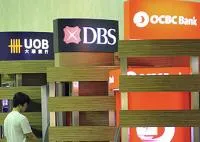
How badly will Singapore banks be hit if home prices slump 45%?
Profits could plunge as much as 24%.
According to Fitch Ratings, Singapore banks - DBS Group Holdings, Oversea-Chinese Banking Corp and United Overseas Bank Limited - are strong enough to withstand a downturn in the city-state's property market as severe as the 45% plunge in private-home prices triggered by the 1997-1998 Asian financial crisis.
Here's more from Fitch:
Fitch believes Singapore banks' housing-loan quality will be shielded by the banks' disciplined underwriting standards, and healthy loan-loss reserve coverage of 113% at end-June 2016. We believe Singapore's private-home prices will weaken further amid an influx of new homes, having declined 9.4% from their peak in September 2013; signs of an oversupplied market have emerged with vacancy rate of non-landed private homes rising to its 11-year high of 10.4%.
Our stressed-scenario analysis shows that as much as 24% could be shaved off banks' earnings, if property prices fell 45% in a year. Fitch's assumptions are harsh and include housing-impaired-loan ratio reaching a high of 5% (end-June 2016: 0.4%) and all defaulted housing loans have an 80% loan-to-value ratio. As a comparison, the average housing NPL ratio of the three Singapore banks reached a high of 4.3% when private-home prices fell 45% from peak to trough in the aftermath of the 1997-1998 Asian financial crisis.
Fitch believes the impact on banks would be cushioned by the property-cooling measures introduced between September 2009 and June 2013; a severe property price collapse could prompt the regulators into reversing some of these measures.
Fitch believes increased foreign home-ownership does not present a credible risk to the housing-loan quality of Singapore banks due to their cautious lending to this segment. Singapore's role as a global wealth-management hub also suggests some of these purchases are long-term investments, thus reducing the risk of capital exodus.






![Lorem Ipsum [ABF 1]](https://cmg-qa.s3.ap-southeast-1.amazonaws.com/s3fs-public/styles/exclusive_featured_article/public/2025-03/a_hand_pointing_to_a_futuristic_technology_5b87c9d0e3_1.png.webp?itok=2w0y1WhS)


![Cross Domain [Manu + SBR + ABF + ABR + FMCG + HBR + ]](https://cmg-qa.s3.ap-southeast-1.amazonaws.com/s3fs-public/styles/exclusive_featured_article/public/2025-01/earth-3537401_1920_4.jpg.webp?itok=WaRpTJwE)








 Advertise
Advertise

